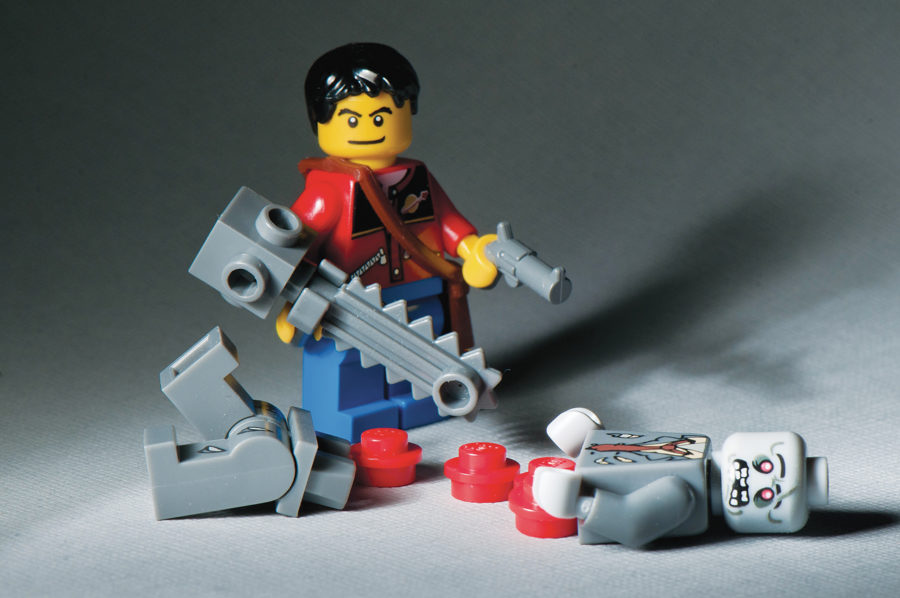Will you survive the zombie invasion?
Courtesy photo: Kenny Louie/Flickr
Opinion – Zombie Apocalypse
October 17, 2010
I got a message the other day on Facebook from a friend who I helped a few years ago to set up an ISU freeze on Central Campus. She was inviting me to join a few hundred other ISU students in an event happening at the end of this month, a “Zombie Invasion!” The game goes a little something like this: Beginning on Homecoming weekend — Oct. 29 — participants will each begin wearing a red bandana visibly on their body to show that they are human, not zombies. A single person will also have a green bandana on. They are the zombie.
The zombies can tag non-zombies to turn them into zombies, thus increasing the zombie population exponentially. But zombies who don’t tag anyone within a week of being turned into a zombie die of starvation and are out of the game. The object, of course, is to survive the invasion. There are also more important rules about what areas on campus are on- and off-limits for the game that can be found on the Facebook event, which currently hosts about 450 confirmed participants.
I think this game should be a ton of fun for participants, as evidenced by its continued success at other colleges across the country and around the world.
The game was actually started by a group of students at Goucher College in Maryland back in 2005 and usually goes by the name “Humans vs. Zombies” on the Internet. Five years after the Goucher students began formulating official rules, there is now an official Humans vs. Zombies website, wiki, and forums hosted by Gnarwhal Studios, a small company formed by the original Goucher College students. They even provide the ability for game organizers to set up a website to keep an active tally of who is still a human and who has turned into a zombie.
So, why play a game with human-eating zombies? Well, because it seems that a lot of us today like zombies. In recent years, movie producers have found them to be excellent movie antagonists, as they don’t exist — to my knowledge — in reality, but they are intensely scary and inherently evil in a sense. Zombies have been featured in movies like “Resident Evil,” “28 Days Later,” “I Am Legend” and my personal favorite at the moment: “Zombieland,” which was featured prominently during last year’s Kaleidoquiz trivia contest.
It is easy to picture yourself as an everyday “hero” survivor in a zombie-infested world, which makes a zombie invasion so much fun to think about, read about or watch movies about.
But let’s be frank. What would we do if zombies really attacked Iowa State? Well, likely only the well-prepared would survive. That’s why I would advise students to check out groups like the Zombie Squad, whose slogan is “We Make Dead Things Deader” or the “Zombie Preparedness Initiative” knowledge-base. Actually a friend of mine who is a grad student at Iowa State recently designed a website called Zombie Strategies with lots of Google Maps integration to help people plan their zombie survival plan.
The university could make preparations for the zombie apocalypse too, just like Doug Johnson at the University of Florida, who last year posted a detailed plan for zombie attack on UF’s e-Learning Support Services website alongside plans for hurricanes and pandemic diseases. Notably, university officials took down Johnson’s overzealous zombie plan that included official forms to declare why and how employees killed infected co-workers after it showed up in local news, but you can still check it out online.
In reality, while a lot of zombie-preparedness groups are fun to check out and have some fun with, many do serve a useful real-world purpose. For instance, while the Zombie Squad’s armored anti-zombie vehicles and protective body armor are pretty cool, the group focuses its chapters on doing charity work and disaster preparation education. They host food drives, blood drives, educational clinics and ham radio networks that serve the community in the name of being prepared for a zombie attack.
We could all learn something from these groups about hoping for the best and being prepared for the worst, especially in light of all of the flooding that seems to happen every few years outside our front door in Ames. It is also good to ponder whether humans could mistakenly create some kind of virus that might turn people into zombies and how we can prevent such a disaster from happening.
But in the end, I’m just happy that zombies have taken on such a pivotal role in today’s society and will be excited to see what transpires when the zombie apocalypse hits Iowa State on Oct. 29.

















